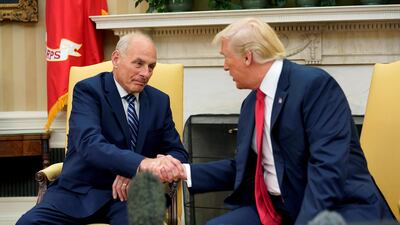The Trump White House often seems more like a surrealist movie, or an absurdist satire, than a normative political drama. But the latest plot twist is a familiar cliché: the Marines – or one of them at least – have landed.
After an especially nightmarish fortnight, Mr Trump must be hoping that his new chief-of-staff, retired Gen John Kelly, is charging to his rescue.
Mr Trump plainly hopes Mr Kelly can use his military bearing, experience and authority to impose discipline in this anarchic White House.
But can even an effective leader enforce meaningful order on Mr Trump's seemingly cultivated, if not calculated, chaos? Or is it too late to salvage this presidency?
Mr Kelly has demanded – and appears to be demonstrating – full authority over White House personnel.
He dismissed the preposterous former communications director, Anthony Scaramucci, who served for only 10 days, and then fired the unqualified National Security Council intelligence director, Ezra Cohen-Watnick, who was previously being protected by White House chief strategist Steve Bannon and the president's son-in-law, Jared Kushner.
Mr Kushner and his wife, Mr Trump's daughter, Ivanka, reportedly accept that they report to Mr Kelly and that he controls access to the president.
But there is at least one key figure who may prove impervious to Mr Kelly's authority, and that is Mr Trump himself.
Mr Kelly has already conceded that he shouldn't bother trying to "manage" Mr Trump, including his bizarre tweets and obsessive consumption of trash television.
Indeed, reckless rhetoric and poor political judgment are the main reasons why, despite complete Republican control of government, his first six months have not yielded a single noteworthy achievement.
Serious erosion of support is developing, even among his base, including rank-and-file Republicans and non-college-educated white Americans. His approval ratings in all polls are at an all-time low and declining.
Moreover, he recently suffered a string of harsh rebukes from constituencies he believes are, or should be, key allies.
The Boy Scouts of America apologised for his shockingly inappropriate speech at their jamboree, which he turned into a self-serving political rally.
Police chiefs and associations indignantly denounced his remarks endorsing gratuitous violence against suspects during arrests.
The military rebuffed his Twitter announcement of a new ban on transgender individuals serving in the Armed Forces. Gen Joseph Dunford, chairman of the joint chiefs-of-staff, said policy won't change until he receives a formal command.
The obviously appalled military isn't just refusing to take such outrageous orders via Twitter. Short of the outright refusal of a directive from the commander-in-chief and open insubordination, this is as dismissive as uniformed brass can be towards a president.
Senate Republicans couldn't pass Mr Trump's healthcare law, and are rebuffing his shrill insistence that they persist with the issue when they have already tried everything and failed. They are also dismissing his demands that they eliminate the filibuster rule and allow most major legislation to be passed by a simple majority vote.
The Senate Republican majority is proving extremely ineffective largely because this president doesn't lead them. He inspires neither respect, nor, despite intensifying hostility and insults, fear. Given his collapsing poll numbers, and looking towards the midterm elections, many Republicans may even prefer openly confronting or dismissing Mr Trump than embracing him.
Amazingly, the only major legislation the Republican Congress has passed since the election is an anti-Trump measure locking in sanctions against Russia to stop him from potentially easing them – the clearest sign of distrust in his judgment on Russia-related matters.
Republicans also told Mr Trump he shouldn't dare fire attorney general Jeff Sessions to try to quash Robert Mueller's investigation into the Trump campaign's ties to Russian operatives.
Mr Mueller has now impaneled a grand jury. That doesn't mean criminal charges are imminent, but it is an unmistakable sign of the scope of the investigation.
Mr Trump said Mr Mueller would be "crossing a red line" if he began to investigate the president's finances and business dealings. That is almost certainly already happening, but there's not much, if anything, Mr Trump can do about it.
Moreover, although Mr Trump’s lawyers indignantly denied it a few weeks ago, he is now widely reported to have personally dictated his son's misleading public statement regarding a meeting Trump campaign officials had with Russian operatives during the last election.
The statement falsely claimed the meeting was merely about adoptions, when, in fact, the Russians had offered supposedly damaging information against Hillary Clinton as part of what they called their government’s "support" for his candidacy. Mr Trump reportedly insisted on the deception despite strong legal advice that his son should tell the truth.
Ineffectiveness is engendering disdain. Unpopularity is feeding on itself. Failure is breeding more failure.
Mr Kelly's skills, therefore, may not be sufficient to break Mr Trump out of the concentric vicious circles swirling around him.
If Mr Trump remains his own worst enemy – by daily inflicting untold political damage via his Twitter account, among other things – even the best manager won't be able to rescue him. The marines may, instead, sink “waist deep in the big muddy” and need to save themselves from a swelling political quagmire.


